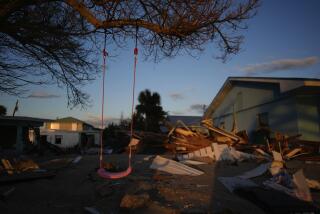Hurricane Packs Punch on the Energy Markets
Gasoline and natural gas futures prices hit new highs as Hurricane Katrina walloped the key Gulf Coast region Monday, but the storm didn’t appear to deliver the catastrophic blow that many feared, leaving oil futures higher but short of the historic $70-a-barrel mark.
Most of the energy facilities in Louisiana, Mississippi and Alabama were shut down as Katrina roared through the region, which accounts for about one-third of the 5.5 million barrels of oil that the United States produces each day and more than 20% of its daily natural gas output.
For the record:
12:00 a.m. Sept. 1, 2005 For The Record
Los Angeles Times Thursday September 01, 2005 Home Edition Main News Part A Page 2 National Desk 1 inches; 42 words Type of Material: Correction
Hurricane maps -- A map of the Gulf Coast with coverage of Hurricane Katrina in Tuesday’s Section A labeled part of Interstate 10 as Interstate 12. Another map showing the storm’s projected path mistakenly showed an island in the Gulf of Mexico.
If repairs to damaged Gulf oil platforms, refineries and pipelines take weeks or months, shortages of oil, gasoline and natural gas could develop, sending prices of those commodities even higher and threatening the U.S. economy, analysts said. But it will take time to gauge the full extent of the hurricane’s damage, adding uncertainty to the energy markets at a time when oil suppliers struggle to keep pace with rising demand.
“We’re in an information vacuum because it’s going to be another couple of days until we get a meaningful damage assessment,” said David Pursell, a principal at Pickering Energy Partners Inc. in Houston.
The industry’s trade group, the American Petroleum Institute, urged consumers to “use energy wisely” in the meantime.
Analysts noted that the region was slow to recover from last year’s Hurricane Ivan, in part because damage to underwater pipelines wasn’t immediately apparent or easy to fix.
Pipeline damage “is generally more difficult and costly to repair,” analyst Doug Leggate of Citigroup Global Markets Inc. said in a note to clients.
The U.S. benchmark grade of crude oil for October delivery shot as high as $70.80 a barrel in overnight electronic trading before closing at $67.20, up $1.07 for the day on the New York Mercantile Exchange. That fell short of the Nymex record close of $67.49 a barrel set Thursday. Adjusted for inflation, oil peaked at more than $90 a barrel in early 1981.
But natural gas and gasoline futures set Nymex records Monday.
Natural gas for September delivery jumped $1.055 to $10.847 per million British thermal units as the winter heating season looms. Natural gas also is used to generate nearly half of California’s electricity.
Gasoline futures for September delivery soared 13 cents to $2.061 a gallon. The rally probably means motorists will see pump prices climb even higher.
In California, the average retail price of regular gasoline hit a record $2.77 a gallon in the week ended Monday, up 2 cents from the previous week, the Energy Department said. The price stood 67 cents higher than a year earlier. The U.S. average price slipped two-tenths of a penny to $2.61 a gallon, up 74.4 cents from a year ago.
Still, industry experts found silver linings in the hurricane’s clouds. They noted that some refineries continued to operate, albeit at reduced rates. The stock market closed higher, including shares of oil companies that are major players in the Gulf of Mexico, such as Exxon Mobil Corp., Chevron Corp. and Marathon Oil Corp.
Oil giant Saudi Arabia also said it stood ready to boost its daily production by more than 1 million barrels a day, to 11 million, to fill any supply shortages caused by Katrina.
And President Bush didn’t immediately release oil from the U.S. Strategic Petroleum Reserve -- a storage facility filled with 700 million barrels of oil for national emergencies -- signaling that the White House didn’t yet expect a major shortage of supplies. The government might use the reserve to make oil loans to refiners facing shortages, government officials said, just as it loaned more than 5 million barrels after Hurricane Ivan.
The reserve “is there for emergency situations, and that would include natural disasters,” White House spokesman Scott McClellan said on Air Force One as Bush flew from Texas for appearances in Arizona and Southern California. The administration has rejected calls to release some of the reserve to mitigate high energy prices, saying Bush would consider the move only in response to a major disruption in supplies.
On Capitol Hill, Rep. Joe L. Barton (R-Texas), chairman of the House Energy and Commerce Committee, asked Bush on Monday to take such action if the hurricane “wreaks havoc” on U.S. oil supplies. Sen. Barbara Boxer (D-Calif.) urged the president to immediately tap the reserve to provide “some relief from skyrocketing oil prices.”
Although Hurricane Katrina’s damage has yet to be tallied, the initial effect appeared to be less than the cataclysm some feared, said Phil Flynn, senior market analyst at Alaron Trading Corp. in Chicago.
After a weekend filled with televised images of Katrina bearing down on the Gulf Coast, “it looks like New Orleans may be spared from annihilation, the levees might hold and the refineries might not be underwater, and that is a big positive for our country,” Flynn said.
Still, there was no discounting even the initial pain of Katrina’s punch.
Tracking devices on two drilling rigs under contract to Shell Exploration & Production Co., a U.S. arm of Royal Dutch Shell, showed that they had drifted from their normal locations, Shell spokeswoman Darci Sinclair said.
“Until the storm has completely passed and it’s safe for us to send out crews and evaluate, we won’t know what, if any, damage has occurred,” Sinclair said. Shell expected to start sending out crews Monday evening, she added.
Another drilling platform broke free of its mooring in Mobile Bay, Ala., and slammed into a bridge, the Alabama Department of Transportation said. It was uncertain who owned the platform.
There also were reports of problems in other sectors of the economy, including:
* The airline industry, already suffering losses partly because of record jet-fuel prices, was forced to cancel hundreds of flights in the South and could be slammed with even higher fuel costs.
* Gulf Coast casinos in Louisiana and Mississippi were shut down; analysts feared they could suffer heavy flooding and a dearth of customers for at least several days.
* Chemical companies such as BASF were forced to close plants in Louisiana, and Japanese automaker Nissan North America Inc. closed its assembly plant in Canton, Miss., idling about 6,000 workers.
The hurricane also was felt in other commodities markets. Corn and soybean prices rose on the Chicago Board of Trade amid speculation that Katrina would damage fields from Louisiana to Ohio.
Energy companies operating in the Gulf have well-scripted preparations when a hurricane approaches.
Shell contracts with private weather services to supplement hurricane information from the National Weather Service. Shell’s Gulf properties include 3,614 miles of pipeline, an offshore liquefied natural gas terminal and 16 offshore platforms.
Other companies have teams dedicated to the evacuation and shutdown of offshore platforms and onshore refineries.
“If there’s anything we’re doing this year that we didn’t do last year, it’s that we’re taking advantage of fixed-wing aircraft to conduct our initial reconnaissance” instead of helicopters, Chevron spokesman Matt Carmichael said.
The planes can be used sooner in risky weather, have more range and provide “more time in the air to visually observe our facilities,” he said.
Staff writers Ronald D. White and John O’Dell in Los Angeles, Edwin Chen in Washington and special correspondent Dana Calvo in Houston contributed to this report.
More to Read
Inside the business of entertainment
The Wide Shot brings you news, analysis and insights on everything from streaming wars to production — and what it all means for the future.
You may occasionally receive promotional content from the Los Angeles Times.











